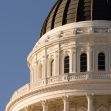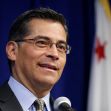When Rudyard Kipling wrote “Never the twain shall meet,” he probably did not realize how apt his poetry would be to describe political conflicts of interest. Questions about how and whether to prevent elected officials from personally benefiting from the votes they cast are all over the news. This questionable practice is called “pay to play,” and a new California law is trying to stop it.
Senate Bill 1439, signed into law by Governor Gavin Newson on January 1, 2023, amends a section of the Political Reform Act of 1974. It requires elected officials to recuse themselves from voting on or participating in any decisions that could financially benefit any person or company that donates $250 or more to their campaigns. Supporters of the bipartisan bill, sponsored by Senator Steven Glazer (D-Orinda) and Sen. Scott Wilk, (R-Victorville), claim it will end blatant influence peddling in California.
Glazer and Wilk’s bill explained that the Political Reform Act of 1974 prohibits an officer of an agency from accepting funds while proceedings before them are pending and for three months after decisions are made. Before enactment of the new law, agencies were described as “any state or local government agency except certain entities, including local government agencies whose members are directly elected by the voters.” (emphasis added) SB1439 removes the exemption for local government agencies. It will now be a misdemeanor to violate the new law, but anyone who unknowingly violates it can simply return the money.
Sounds like a necessary and ethical idea, right? Not everyone agrees. Eight trade associations and two local officials filed a lawsuit on February 22 to block it. The plaintiffs’ lawsuit includes the Family Business Association of California, California Restaurant Association, California Retailers Association, California Building Industry Association, California Business Properties Association, California Business Roundtable, Sacramento Regional Builders Exchange, California Manufacturers & Technology Association, Rancho Cordova City Councilmember Garrett Gatewood and Sacramento County Supervisor Pat Hume.
The lawsuit was filed against the state’s Fair Political Practices Commission, the agency that is set to enforce the new law. Attorney Thomas Hiltachk filed the petition that asked the Sacramento County Superior Court to overturn the amendments. Plaintiffs claim that the California legislature never had the authority to amend the 1974 Act to the degree permitted under the new law. They called it “overbroad” and said that it “improperly alters the Political Reform Act by infringing on constitutional free speech protections related to the right to petition governments.”
Senator Glazer disagrees. He told the Silicon Valley News that he was not surprised that “power interests want to maintain the pay-to-play influence-peddling pipeline.” He also commented on the strategic timing the plaintiffs used for their lawsuit. The Sacramento Bee said the bill passed “without controversy” and was signed by Governor Newsom in November. The lawsuit was filed two months later, Glazer said, because plaintiffs were “trying to protect the financial interests that are attempting to influence these specific local governmental decisions, which this bill stopped.”
Glazer disputed plaintiffs’ argument that the law infringed on free speech. He said the “law does not harm anyone’s right to contribute to a politician” but is directed toward local government officials who take money from specific financial interests that will benefit from their decisions. Richard C. Miadich, the Chair of the Fair Political Practices Commission also criticized the timing of the lawsuit and said the lawsuit was “disappointing.” He said it came “months after we’ve begun issuing guidance, gathering public input and crafting regulations.”
Robert Rivinius, executive director of the Family Business Association of California, disputed charges about the strategic delay in challenging the new law. He claimed that he had not been aware of the bill until it became law. He told the Silicon Valley News that “We always have the courage to oppose bad legislation” and that this new bill “somehow got past us and we didn’t realize the severity of what would happen.”
Several nonprofit organizations, including California Common Cause, oppose the lawsuit. They applaud the new law that they say will stop plaintiffs from “rigging the system in their favor over upholding the will of the people.”
Glazer said he could not predict how the courts will view the lawsuit.
When the Supreme Court decided Citizens United v. Federal Election Commission in 2010, it opened the door that permitted independent expenditures for political campaigns by corporations and other associations. Senator Bernie Sanders (I-Vt.) is among those who say that because of Citizens United, “American democracy is under attack.” Will SB 1439, a state law that limits the conflicts of interest caused by allowing contributions to elected officials by those who have matters before them, help decide just how much California’s new law will prevent the attack?






